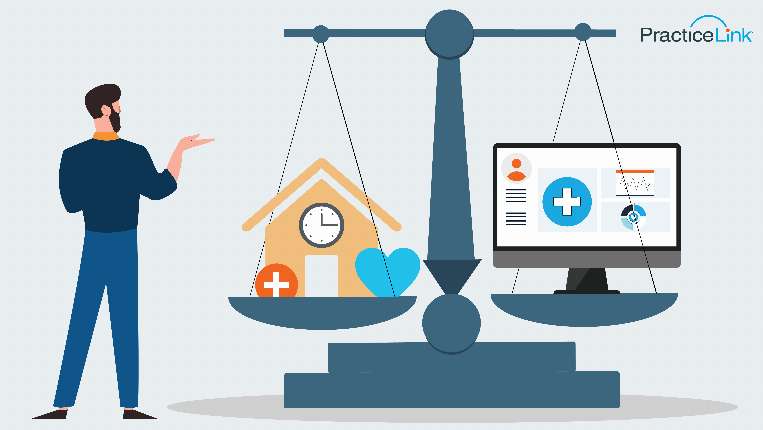Technology and physician work-life balance
 Posted by Megan Trippi
Posted by Megan Trippi

Maintaining a healthy work-life balance is a significant challenge for physicians. With increasing patient loads, administrative responsibilities and the ongoing need for professional development, physicians often find themselves struggling to make time for their personal lives and better self-care. Fortunately, technology, often seen as a contributor to the stress of modern life, can be a powerful ally in enhancing work-life balance for physicians.
Digital health records: Streamlining administrative tasks
One of the most significant technological advancements in healthcare has been the adoption of Electronic Health Records (EHRs). EHRs have revolutionized the way patient information is stored, accessed and shared. For physicians, the transition from paper-based records to digital ones means less time spent on paperwork and more time available for patient care and personal life. EHRs allow for quicker access to patient histories, lab results and medication lists, reducing the time spent on patient management. They facilitate better coordination among healthcare professionals, thereby improving care and reducing redundancies.
Telemedicine: Bridging the distance
Telemedicine has emerged as a game-changer, especially in the context of work-life balance. It allows physicians to consult with patients remotely, reducing the need for travel and physical presence at the workplace. This flexibility can significantly decrease work-related stress and create more time for family and leisure activities. Telemedicine also expands access to healthcare, making it easier for physicians to reach patients in remote or underserved areas, which can be particularly satisfying for those dedicated to broadening healthcare access.
AI and Machine Learning: Intelligent assistance
Artificial Intelligence (AI) and Machine Learning (ML) are increasingly being integrated into healthcare systems. These technologies can analyze vast amounts of data quickly, aiding in diagnosis and treatment planning. For physicians, this means assistance in making more accurate and efficient clinical decisions. AI-driven tools can also handle routine tasks such as scheduling appointments and managing patient follow-ups, freeing up time for physicians. Delegation of tasks to intelligent systems allows physicians to focus more on direct patient care and less on administrative burdens.
Mobile health applications: Continuous care and convenience
Mobile health applications have made it possible for physicians to monitor their patients’ health remotely. These apps can track vital signs, medication adherence and other health parameters, providing real-time data to physicians. This ongoing monitoring enables early intervention when necessary, improving patient outcomes. For physicians, mobile health apps offer the convenience of staying informed about their patients’ health without being physically present at all times, thus balancing professional responsibilities with personal time.
Virtual Reality and simulation: Efficient training
Virtual Reality (VR) and simulation technologies offer innovative ways for physicians to train and develop their skills. These technologies provide realistic, immersive experiences that can replicate a wide range of clinical scenarios. By using VR and simulation for training, physicians can enhance their skills in a time-efficient manner, without compromising their work schedules or personal time. This efficient approach to ongoing education is crucial in a profession where continuous learning is essential.
Wellness and mindfulness apps: Supporting mental health
Robust mental health is paramount for physicians to maintain a healthy work-life balance. Technology offers various wellness and mindfulness apps designed to help manage stress, anxiety and burnout. These apps provide resources like guided meditation, breathing exercises and cognitive-behavioral therapy techniques. By incorporating these tools into their daily routine, physicians can better manage stress and maintain mental well-being amidst their demanding careers.
Challenges and considerations
While technology offers numerous benefits, it is also important to address the challenges it poses. Too much reliance on technology can lead to issues such as digital fatigue and decreased face-to-face interactions. Ensuring data security and privacy in digital health records and telemedicine is also crucial. Furthermore, the initial learning curve associated with new technologies can be a temporary stressor for some physicians.
The integration of technology in healthcare presents a unique opportunity to enhance physician work-life balance. It is essential to approach these technological advancements mindfully, ensuring they serve as tools for empowerment rather than sources of additional stress. As healthcare continues to evolve, the thoughtful integration of technology will be key to achieving a sustainable balance between professional commitments and personal well-being for physicians.

